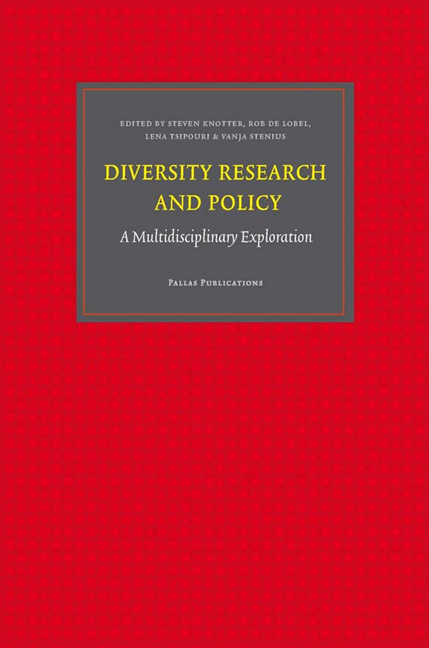Book contents
- Frontmatter
- Contents
- Acknowledgements
- 1 An Introduction
- 2 Diversity and Social Anthropology
- 3 Diversity and Sociology
- 4 Diversity and Criminology
- 5 Diversity and Ecology/Ecological Economics
- 6 Linguistic Diversity
- 7 Diversity and Architecture
- 8 Diversity and Urban Planning
- 9 Diversity and Economics
- 10 Diversity and Diversity Management in Business and Organisation Studies
- 11 Diversity and (Organisational) Psychology
- 12 Diversity and Law
- 13 Diversity and Public Policy
- 14 Conclusion
- About the Authors
- About the Reviewers
2 - Diversity and Social Anthropology
Published online by Cambridge University Press: 15 January 2021
- Frontmatter
- Contents
- Acknowledgements
- 1 An Introduction
- 2 Diversity and Social Anthropology
- 3 Diversity and Sociology
- 4 Diversity and Criminology
- 5 Diversity and Ecology/Ecological Economics
- 6 Linguistic Diversity
- 7 Diversity and Architecture
- 8 Diversity and Urban Planning
- 9 Diversity and Economics
- 10 Diversity and Diversity Management in Business and Organisation Studies
- 11 Diversity and (Organisational) Psychology
- 12 Diversity and Law
- 13 Diversity and Public Policy
- 14 Conclusion
- About the Authors
- About the Reviewers
Summary
A Brief Description of the Discipline of Social Anthropology
Social anthropology is a discipline situated between the social sciences and the humanities that studies human behaviour and knowledge including human relationships, symbols and their meanings, values, norms and related phenomena. These areas of the study of social anthropology are frequently incorporated into the synoptic term culture.
Social anthropology includes two areas of study:
1 the interactional area, which studies human behaviour in groups, concentrates on the question of how human groups are structured, the power relations and relations of responsibility and obligation that exist within them, and how the groups conduct themselves in mutual contact.
2 the ideational area, which focuses on the knowledge, symbols, values and norms that are applied in human activities, studies what objectives people want to achieve, which models they follow, what they believe in, what attitudes they adopt towards the world around them, and what significance their activities and the context have for them.
This discipline has two aims:
1 To examine, describe and analyse human behaviour, knowledge symbols, values and norms and related phenomena and thus to contribute to the study of human beings as a specific form of life in its unity and diversity;
2 To comprehend how people perceive the world, how they evaluate and categorise it, and how they reflect on their own activity.
Social anthropology works with two points of view that are relevant to the aims of this volume:
a the etic perspective, a perspective of scientific categories, concepts and explanations (observer's perspective);
b the emic perspective, a perspective of the studied agents and their view of the world (participant's perspective).
Social anthropology is currently developing in many diversified milieus, which influence its priority topics. Whereas in Great Britain it largely focused on research of populations outside of Europe until the second half of the twentieth century, in the United States it concentrated on studies of the native population of the American continent and immigrants, alongside research on the Third World. In contrast, Russian anthropology devoted a great deal of attention to the study of non-Russian nations within its territory. In continental Europe, the discipline was dominated by studies of the researchers’ own nations, namely from an historical perspective.
- Type
- Chapter
- Information
- Diversity Research and PolicyA Multidisciplinary Exploration, pp. 21 - 42Publisher: Amsterdam University PressPrint publication year: 2012



